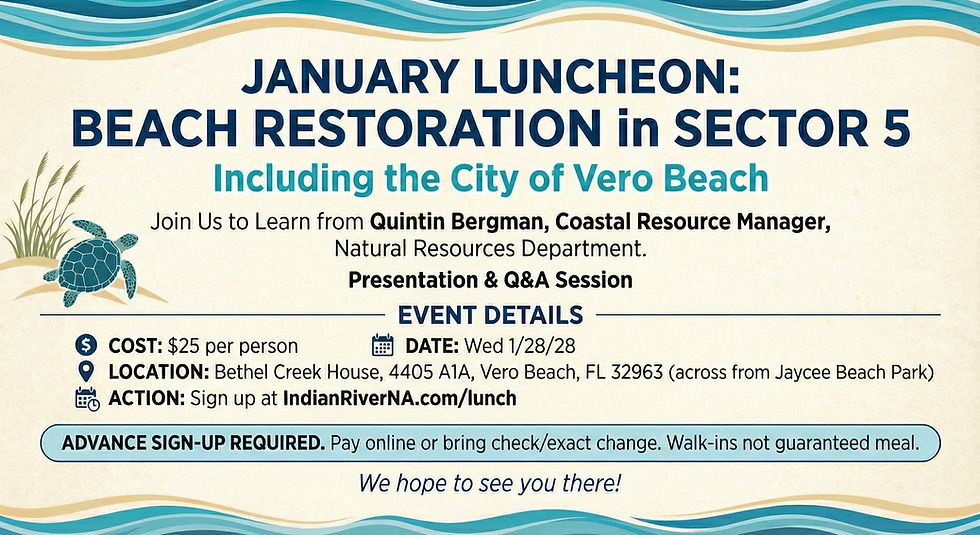Positive Change thru Civic Governance
- IRNA

- Sep 2, 2022
- 3 min read
Updated: Oct 12, 2022
Citizen involvement is an important contribution to good governance and the Indian River Neighborhood Association (IRNA) encourages participation from individuals and organizations in civic affairs. Recently a new civic group was formed which took issue with the City Marina’s revitalization plan, specifically the increased size of the proposed boat barn and other expansion plans at the City marina. Now, however, they proposed a referendum for this November’s ballot that would add the marina to the list of 26 other City Charter protected properties and include restrictions that would require a vote of City residents to approve certain changes to those properties.
Three years ago, after considerable public input from individuals and groups, including the IRNA and Clean Water Coalition of Indian River County (CWC), the City marina was saved from being sold or leased to an outside commercial vendor. Plans to refurbish it have been discussed at Council meetings, Marina Commission meetings and special call workshops for at least two years. It was through recent public input, including those of the new civic group, that City Council reduced the size of the new marina boat barn and has reduced the number of slips originally planned (including those behind the dog park). They and staff are still getting public input about other issues concerning the marina such as the dredging process and stormwater runoff.
If voters approve both the Three Corners referendum already on the ballot and the new referendum, how would the Three Corners project proceed? Would any developer be willing to take on such complications as voter approval and be subject to time delay, uncertain completion dates and costs for interest, labor, materials, etc.? The Three Corners might never come to fruition. The City appointed a special committee and hired a highly respected planner to guide the development of Three Corners. They held five public charrettes, hosted a forum on the internet and held multiple public meetings before approving a plan incorporating all this public input. At the final meeting, the planner stated he had never been involved with a project that had so much beneficial input from its citizens. We hope you participated.
Our parks, museum, theatre, tennis courts, boat ramps, Youth Sailing Foundation, Vero Beach Rowing Club, Downey Pavilion, dog park and the 20+ other properties under charter protection offer a wide variety of recreational opportunities to both City and county residents. The cultural offerings of the Vero Beach Museum of Art and Riverside Theatre enhance the quality of life of our City residents, guests and others. As with any future plans, these entities hire experts to design and engineer new projects at considerable expense. Many of the plans are funded through charitable donations. Would donors be as forthcoming if they realized the plans could be shut down by a vote of City residents not enamored of the proposed project?
Cities must evolve to stay vibrant physically and economically. Change is constant. It’s how we face the challenges of growth and transform them into positive results that counts. We all want to protect and preserve our way of life in this beautiful community, as is the intent of the new civic group, but we need to consider the long term ramifications and unintended consequences that this change to the Charter might have. Vaguely worded, the new referendum is open to misinterpretation and misuse as was the State’s well intended Florida Water and Land Conservation Initiative (2014, Amendment 1).
Our City Council needs and welcomes public input through Advisory Commissions, Council meetings, Special Call workshops, and personal contact. That is how representative democracy works. However, the proposed referendum would hamstring our representatives from making important decisions impacting the future of our City. Does each City voter have the time or inclination to research in depth the issues raised by many potential referenda and make informed decisions at the ballot box? Each and every decision bears a financial responsibility. It’s the City Council who, by law, bears the responsibility for future planning and how to finance it.
It is, after all, what we elected them to do.
Mike Johannsen
Chairman, Indian River Neighborhood Association
This opinion piece appeared in the PressJournal and is available here on TCPalm's site.




Comments